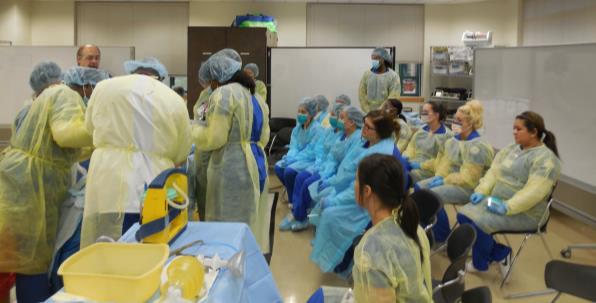Mini-Grant Madness: Life-saving skills learned in cadaver lab

Dr. Kovar and nursing students performing an autopsy to determine cause of death. Among many skills, the cadaver lab allowed LSC-Montgomery students the opportunity to practice advanced airway maneuvers to perfect lifesaving techniques.
Each year, thanks to generous funding from the Lone Star College System and the Lone Star College Foundation, a select number of mini-grants are awarded to faculty to fund innovative project ideas that address the college's goals and initiatives.
"These mini-grant funds are meant to assist faculty and staff in coordinating exemplary projects which are not normally funded through the regular budgetary process," says Fiona Burnett, Program Coordinator, LSC Foundation. "Mini-grants are also an excellent source of seed funding to test a cutting-edge idea prior to seeking other external and longer-term funding."
Recently Dr. Kelly Weller, the program director for the Emergency Medical Services Professions program at LSC-Montgomery made a mini-grant request for funds to implement a cadaver lab, something not often experienced in the community college setting. Dr. Weller partnered with UT Southwestern Medical School in securing the cadaver, and implemented collaboration with other departments including: Nursing, ADN and LVN, Medical Radiologic Technology, EMS - EMT and Paramedic students, and Anatomy and Physiology students. Over 500 students benefited from the cadaver lab, with each group taking away lessons appropriate to their field of study.
"The cadaver lab was initially conceived to provide Paramedic students the opportunity to intubate, the placement of a breathing tube in the trachea. This is a difficult skill, and opportunities to practice are limited to occasional procedures in the operating room under the watchful eye of an anesthesiologist, although performance of this skill is an entry level expectation of employers." says Dr. Weller. She goes on to say that, "we did not realize how incredible an experience this would be for us as faculty, and for our students. We encountered several challenges which nursing and EMS faculty collaborated on and were able to solve. We taught together, with many of us pointing out unique things from our own fields."
A significant reason for the success of the cadaver lab results from the involvement of local ER physician Jay Kovar, MD, FACEP, Medical Director of EMS. Dr. Weller says that "Dr. Kovar was an incredible speaker who was able to speak to the level of all of the students. During the dissection his knowledge was particularly important and he was able to identify many minor structures and relate those to the disease process for the students."
The measured outcomes were impressive: students reported that their understanding of human anatomy was greatly enhanced by being able to look at how the various organs were placed within the body cavities. Plus, 100% of the participants demonstrated competency in the skill of intubation, as evaluated by Dr. Kovar.
"Students have reported to their faculty that in operating room clinicals, when the anesthesiologist finds out that they have had cadaver experience, they are much more willing to allow the student to practice this difficult and life-saving skill under their auspices," says Dr. Weller, "and this type of experience is invaluable."
Implementation of the cadaver lab has also helped assure LSC's clinical partner, Conroe Regional Medical Center that the EMS and nursing programs atLSC-Montgomery are working hard to make sure that the students are prepared for the clinical environment.
To make a donation to a variety of college programs, click HERE.